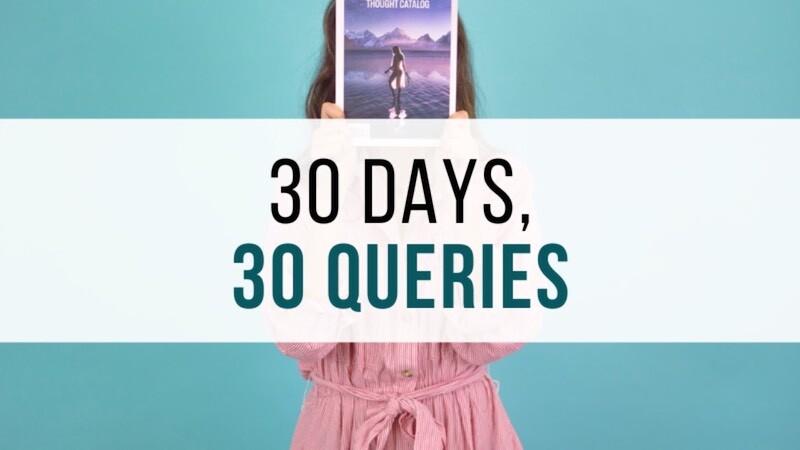IN THIS ISSUE
- From the Editor’s Desk: The highlight reel
- On The Wordling: A three-year plan for growing your freelance career
- News & Views: Why is genre fiction more diverse than literary fiction?

FROM THE EDITOR’S DESK
Hi friends,
When you’re looking at other writers, remember that what you’re seeing is their highlight reel.
You’re seeing their published work, their awards, their loyal readership.
What you’re not seeing is the 77th revision on the novel, the rejections, the showing up to work every day even when it’s difficult, even when it’s thankless, even when it’s unrewarding. What you’re not seeing is the hate mail that gets them down, the insecurity that stops them from writing, the negative feedback that makes them never want to put themselves out in public again.
So if you’re tempted to compare, compare not only what they have achieved in their highlight reel, but what they have done to achieve it.
Then go do that.
Enjoy the issue!
Natasha Khullar Relph
Editor, The Wordling
ON THE WORDLING
Freelance Writing: A Three-Year Plan for Growth
If you’re looking to grow quickly in your freelancing career, here’s a step-by-step three-year plan for success.
How I Sold 100 Articles During My First Year of Freelancing
The 13 steps that resulted in 100 paid writing credits in my first year as a freelance writer.
Read all our articles on the art, craft and business of writing.
WHAT’S INSIDE WORDLING PLUS?
A proven process that has launched the careers of hundreds of writers, facilitated countless $1-a-word assignments, and led to thousands of published bylines in the pages of top publications such as The New York Times, TIME, National Geographic, BBC, Discovery, CNN, The Washington Post, The Wall Street Journal, Marie Claire, and so many more.
This course gives you a clear-cut path for getting assignments and blends detailed training videos with stealable templates, coaching, and personalized feedback.
Kiss the guesswork goodbye.
And say hello to a freelance writing career that you can be proud of.
“For anyone wanting to live and work as a freelance writer, this woman—Natasha Khullar Relph—is seriously damn helpful. Since I did her course last year I’ve written for Aeon, Discover, BBC Wildlife (and was interviewed by NPR in the US) and am now working on stories for Wired, GOOD and (maybe) Marie Claire. It’s full-on and intense and she takes no shit—nor excuses!! But it works…” – Karen Emslie
NEWS & VIEWS:
Diversity in publishing? You’ll find it in genre fiction

For generations, genre fiction has been looked down upon by a snobby literary establishment, even as the numbers tell a different story. In an interview with Publishers Weekly, adult book buyer Jeanne Costello said that while general fiction at her store grew by 7% in the first half of 2023 over the same period in 2022, genre fiction had posted bigger gains—a 23% sales increase in mysteries, 26% in SFF, 36% in horror, and 64% in romance. These statistics are mirrored across Western publishing markets. Science Fiction & Fantasy, for example, may exceed £60 million in sales this year for the first time since accurate records began.
A big part of the reason for this growth is that genre fiction is leading the way in aspects that matter to younger readers—diverse and progressive storytelling. In the same article, BrocheAroe Fabian, who owns the online bookstore River Dog Book Co. noted that genre fiction has been inclusive for a long time and that, “if you wanted to read diverse books, you read genre fiction.”
Not only do Gen Z demand diverse books, they actively seek them out. Data from Wattpad and Wakefield Research shows that Gen Z readers are “going online to find the representation they can’t find in bookstores, with more than four out of five (83%) Gen Z readers (aged 18-25) turning to online sources like webnovels, e-books, and webcomics for diverse stories.” Further, 79% of Gen Z respondents polled said “diversity and representation is important to them when choosing books, movies, or other forms of entertainment.”
And what do editors in traditional publishing want to see in genre fiction? Polygon asked editors in SFF and here’s what they said:
Nivia Evans, Editor, Orbit/Redhook: “Traditional tropes or stories suddenly feel fresh and new as soon as they’re taken out of the expected places… In science fiction or fantasy, we’re used to working with tropes. That’s what people really love. They love seeing the things they grew up with remixed and rehashed. And as soon as you add new voices and cultures, new perspectives, the things people may have been tired of feel original.”
Ruoxi Chen, Associate Editor, TorDotCom Publishing: “I was brought up on a lot of science fiction media that I still love, but if you watch Star Wars or Firefly or Blade Runner, those are visions of the future steeped in Asian aesthetics, Asian culture, and Asian mythology, but stripped of actual Asian people. You can love something that cuts you out, but that’s not the future of the genre that I want to see… It really heartens me that there is enough space in the genre now where you can see, ‘This is Singaporean SF, this is Vietnamese SF, there’s Chinese SF, there’s SF from the Chinese diaspora.” So readers can say, ‘I’m interested in this specific reaction from this specific part of a given culture.’”
Angeline Rodriguez, Associate Editor, Orbit Books: “This is my bias coming through, but I would specifically love to see a return to form for Latinx speculative fiction. Some of the genre’s earliest origins, in magical realism and surrealism, had their most formative literary movements in Latin America already… So often with new writing from underrepresented authors, you see it pitched as, “You know, it’s Lord of the Rings, but diverse!” Or “It’s Dune, but it’s brown!” There are good reasons for doing it that way, based on how the industry operates. You’re often trying to re-create success. But I would like to see not, “This is the same old genre you love, but with extra melanin,” but new genres entirely, that are born from a non-white experience.”
Christina Orlando, Books editor, Tor.com: “The trend toward hopepunk that we’re seeing right now is especially key for marginalized voices. I’ve seen a lot of queer writers tackling hopepunk futures, especially imagining queer-normative futures, like the one in Phoenix Extravagant by Yoon Ha Lee. Those are things I’m really excited about seeing.”
ALSO SEE
“Rizz,” slang for “style, charm, or attractiveness,” or “the ability to attract a romantic or sexual partner” is Oxford’s 2023 Word of the Year.
Here’s a cool story on how audio journalists are using new ways to produce, distribute and monetize their work.
And finally, Latinx authors are renowned in sci-fi and fantasy. So why aren’t more of their books being published?
GLOBAL REPORT
ARGENTINA: “In his radio comments, Milei described the public media outlets he wants to make private as amounting to “a covert ministry of propaganda.” He complained during the presidential race that the coverage of his campaign in state-run outlets was highly negative.”
FRANCE: “Topo’s strategy is simple: tell the news through comic strips. The magazine, whose print edition comes out every other month, publishes news articles exclusively in a graphic-novel format. It presents itself as being “for those under 20 years old (and others),” but its core target is 13- to 15-year-olds.”
CANADA: “What stands as perhaps the hardest element of this to understand for many international publishing professionals is how there could be so vehement a resistance to respecting copyrighted content, its authors, and publishers, in so admired a national culture as that of Canada with such a sophisticated educational complex in a case that now has passed the 10-year mark.”
QUOTE OF THE WEEK
“A storyteller makes up things to help other people; a liar makes up things to help himself.”
– Daniel Wallace
LIKE WHAT YOU’RE READING?
Time taken to assemble this newsletter: 5 hr 20 min
If you’re enjoying The Wordling, support our work by buying us a coffee.


